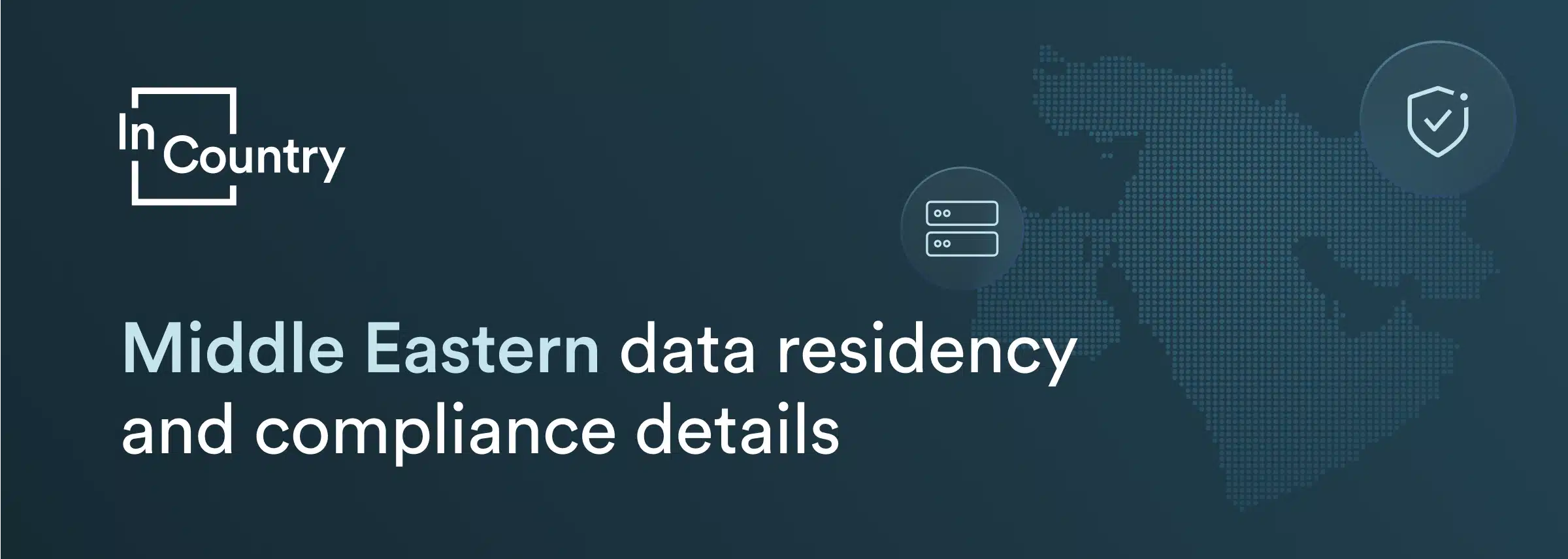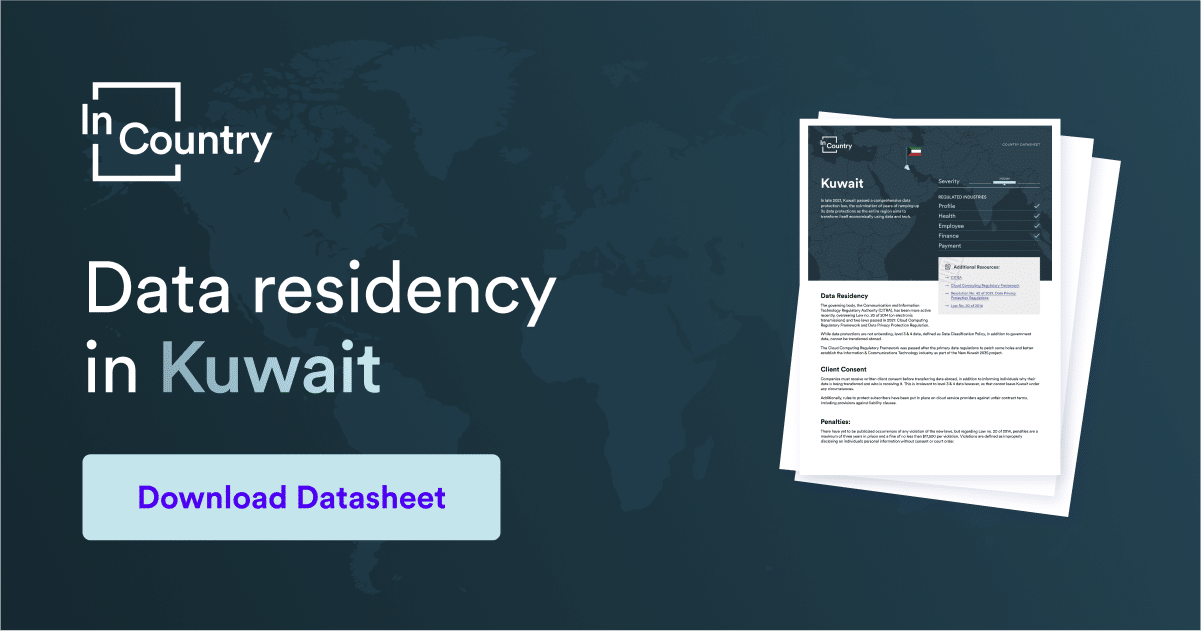The Middle East is a fast-emerging growth center for cloud software and digital transformation. However, many cloud initiatives in the Middle East also require data residency and other compliance requirements.
As you review regulations and data residency requirements from country to country, you will discover slight differences that were implemented to meet the unique needs of each country. This makes it tricky to maintain compliance when you have operations across several countries. InCountry solves the Middle East data localization challenge for you with its Data Residency-as-a-Service solution.
Before we get ahead of ourselves, let’s review the data residency laws across countries in the middle east.
Development in data protection regulations in the Middle East
Interestingly, the first known Middle East Data Protection Laws were in Qatar, with the introduction of the Personal Data Privacy Protection Law of 2016, which was implemented in 2017. It created guidelines for processing personal data in Qatar. A short while later, in 2018, Bahrain rolled out its data regulations to provide guidelines for processing data, consent requirements, etc., in the country.
Kuwait followed in 2019 with a draft law with several data protection laws. Much later, in 2020, Saudi Arabia and the United Arab Emirates introduced their versions of data regulations in their countries. Oman had its first regulations in February 2022, after a royal decree promoting personal data protection laws was established. This marked the beginning of data protection regulations in Oman. Jordan is currently in the process of launching its data protection laws.
It’s clear that data protection laws are a relatively new development in the Middle East. In the subsequent section, we shall review the data protection regulations within these nations.
Saudi Arabia
Saudi Arabia will soon begin the implementation of its Personal Data Protection Law (PDPL) to safeguard personal information and establish a comprehensive framework for data protection. This law emphasizes obtaining consent before processing personal data and outlines lawful bases for data processing. It provides individuals with rights to access, correct, object to, and request the erasure or restriction of their personal data.
The PDPL also addresses international data transfers, requiring adequate protection or appropriate safeguards. Organizations must implement measures to secure personal data and report data breaches to the competent authority and affected individuals. The law includes enforcement mechanisms and penalties for non-compliance. Overall, data protection in Saudi Arabia prioritizes consent, individual rights, international data transfers, data security, and accountability.
United Arab Emirates (UAE)
The data protection regulations in UAE stem from the Federal Law No. 2 of 2019 on personal data protection. It’s important to note that all entities, regardless of whether they are situated in the mainland or free zone, are bound by the law when it comes to processing data. This means that any organization handling data must first obtain the consent of individuals before proceeding with any data processing activities. It’s a crucial requirement to ensure that individuals have control over how their data is used and to maintain transparency in data processing practices.
Furthermore, it grants individuals rights such as accessing, correcting, and deleting their data and withdrawing consent. It allows data transfer only to countries with adequate data protection or sufficient security measures. This ensures individuals’ control over their data and safeguards it during transfers.
Finally, it directs organizations to notify the authorities in the event of a data breach. It also lines out penalties for countries that fail to comply with these standards.
Bahrain
This is an Island country located between Qatar and the northeastern coast of Saudi Arabia, with a population of over 1.4 million people. Their Data regulations date back to 2018. As expected, it applies to data processing entities in Bahrain. It requires organizations to obtain the permission of data owners before processing their information. The law also grants data owners (individuals) the right to access their data and demand its correction or permanent deletion.
For data transfer, Bahrain’s data regulations permit data transfer outside the country only on specific grounds, such as the consent of the original data owners, ensuring adequate security in the recipient country. Organizations are expected to notify the appropriate authority if there is a data security breach. Finally, it lists out the punishments for none compliance.
Kuwait
Data protection in Kuwait is similar to what is obtainable within the region but with greater reference to owner control. Kuwait’s data regulation outlines the steps for data processing within Kuwait and for data transfer outside the country. It also reserves the rights of citizens to access their data, request edits, or for the data to be permanently deleted.
Finally, the regulation makes strict requirements for organizations to have adequate security and confidentiality protocols to improve consumers’ data security. It also introduced the Communications and Telecommunications Regulatory Authority (CITRA), to oversee data protection in the country and enforce compliance.
Oman
An important development took place in February 2023 with the implementation of the Personal Data Protection Law (PDPL) in Oman, which introduced a fresh set of legal obligations for companies involved in the processing of personal data. Under this law, businesses are required to follow an opt-in approach, meaning that they must obtain user consent before processing any personal data. Furthermore, the PDPL emphasizes the need for data processing entities to provide comprehensive information to data subjects through their privacy policy. This includes details about the data controller, contact information of the Data Protection Officer (DPO) and the purposes for which the data is being processed, among other essential details.
For processing sensitive data such as health records, financial data, genetic data, etc., a data processing entity must be permitted by the ministry before they can be involved. Flouting this policy attracts a financial penalty between $50,000 to $260,000!
Finally, like most regulations in the region, it secures the rights of data subjects or individuals. Common rights such as the right to access your data, request correction or permanently deleting the data, and the right to revoke previous permission granted to process your data.
Jordan
As the name suggests, it is a country located on the east bank of the River Jordan. Currently, there are no active Personal Data Protection Laws in Jordan. They only have a draft that is being reviewed to be adopted as their data regulations.
This new draft covers regular data regulations like “obtaining consent” from data subjects. But this time it stretches it to state that it must be in writing and is only valid for a limited period, after which another consent must be sought. Additionally, it stipulates that when transferring personal data outside Jordan, the receiving party must have adequate data security protocols in place, which must be at the level of what is available in Jordan, or such transfer will be deemed inadequate and prohibited.
In addition to the aforementioned provisions, as outlined in this draft, it is explicitly prohibited to process the personal data of an incapacitated individual without the explicit written consent of their parents or legal guardian. This safeguards the rights and privacy of individuals who may not have the capacity to provide consent themselves. Furthermore, the draft also highlights specific conditions that must be met in order to process sensitive personal data. These conditions ensure that the processing of sensitive information is subject to heightened scrutiny and stringent safeguards, promoting responsible and ethical handling of such data.
Qatar
In Qatar, the Data Privacy Law, also known as Law No. 13 of 2016, has been implemented to safeguard personal data and establish a robust legal framework for its processing. This comprehensive regulation applies to all individuals, organizations, and authorities involved in data processing activities within the country. A key principle emphasized by this law is the requirement to obtain the explicit consent of data subjects before their data can be processed. Additionally, the Data Privacy Law sets out clear conditions that must be met to ensure lawful and responsible data processing practices are followed. This ensures that personal data in Qatar is handled in a manner that respects privacy and upholds legal standards.
Individuals are empowered with a range of rights under this law, including the ability to access their data, request corrections, and object to processing activities. The legislation also addresses the transfer of data across borders, emphasizing the need for suitable safeguards to protect personal information. Organizations are obligated to implement technical and organizational measures to secure data, and they are required to report any data breaches to the relevant authority and affected individuals. These provisions aim to uphold data protection standards and ensure the privacy and security of personal data.
Overall, the Data Privacy Law in Qatar establishes a comprehensive framework for personal data protection and privacy, aiming to ensure the responsible handling of personal information within the country.
Data residency in the Middle East – InCountry’s approach
Navigating the complexities of the Middle East data residency requirements can be challenging for international companies seeking to operate in the dynamic business landscape of the region. InCountry, a leading provider of Data Residency-as-a-Service, offers solutions to help organizations comply with local data protection laws.
Our Data Residency-as-a-Service solution helps you stay compliant while you carry out your normal business efficiently and securely. InCountry’s Data Residency solutions enable companies to enter new markets easily while maintaining compliance in existing markets. With our 100% compliant infrastructure in numerous countries, extensive APIs that support storing, processing, and delivering data, etc., you can rest assured that your compliance worries are fully resolved.
Contact us today and let’s discuss your needs and show you how much value we could bring to your business.





